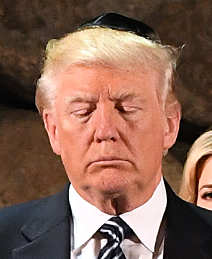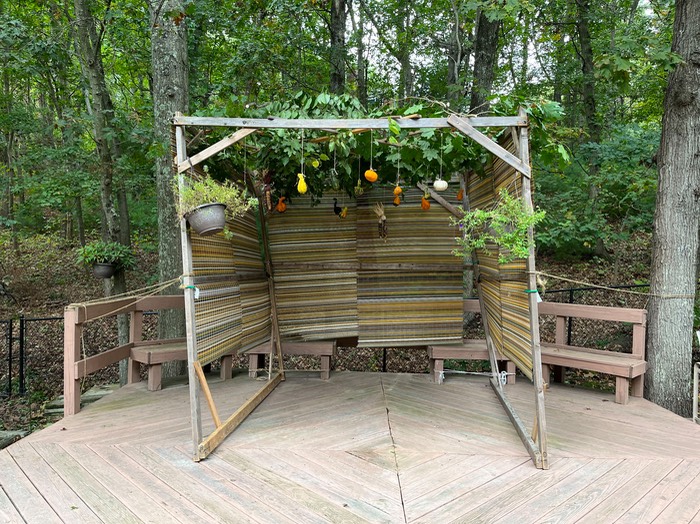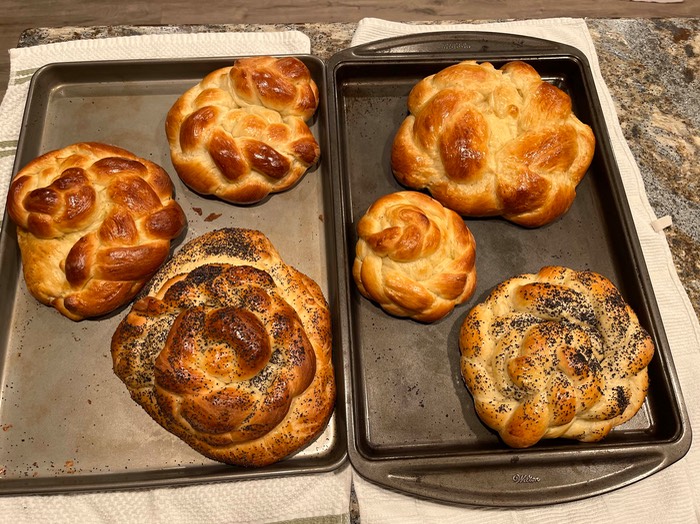Weekly Quiz 2022
Pew Research Survey
The Pew Research Center recently surveyed 10,588 Americans about their attitudes regarding religion’s role in public life. The survey found that 60% of respondents believe that “the founders of America intended for the U.S. to be a ‘Christian nation’.” And 45% stated that “the U.S. should be a ‘Christian nation’.” Yet only 15% agreed that Supreme Court Justices should “bring their own religious views into how they decide major cases.” Among Jewish respondents to the survey, which of the following responses were given?
Pew Research Center is in the public domain, via Wikimedia Commons
A. 8% of Jewish respondents said that if there is a conflict between the will of the people and the Bible, then the Bible should take precedence.
B. 16% of Jewish respondents said that the United States should be a “Christian nation.”
C. 16% of Jewish respondents said that the United States should be a “Jewish nation.”
D. 71% of Jews believe that houses of worship should stay out of political matters.
E. 67% of Jewish respondents said that the Rabbi’s sermon put them to sleep.
Antisemitism
Donald Trump has come under criticism for recent comments he made about the Jewish community that some viewed as antisemitic. He noted on his social media platform Truth Social that “U.S. Jews have to get their act together and appreciate what they have in Israel – Before it is too late!” He added, “No President has done more for Israel than I have. Somewhat surprisingly, however, our wonderful Evangelicals are far more appreciative of this than the people of the Jewish faith, especially those living in the US.” Jonathan Greenblatt, CEO of the Anti-Defamation League stated that “In this moment, Jewish people are feeling besieged, and when the former president of the United States makes — if you will — an unveiled threat, don’t excuse that by harkening back to policy things you may have done years ago...So when the President says ‘before it’s too late,’ it sounds like a threat in an environment where Jews already feel threatened.” And the American Jewish Committee tweeted, “Support for the Jewish state never gives one license to lecture American Jews, nor does it ever give the right to draw baseless judgments about the ties between U.S. Jews and Israel.” Not everyone concurred, however. Which of the following disagreed with the charge that Donald Trump’s remarks were antisemitic?

Yarmulke with face detail, President Trump by U.S. Embassy Tel Aviv is in the public domain, via Wikimedia Commons
A. “So I don’t think so,” said Ye (formerly Kanye West). Ye also recently said “the Jewish community, especially in the music industry…they’ll take us and milk us till we die.” He also stated that Jared Kushner only brokered the Abraham peace accords between Arab nations and Israel “to make money.”
B. “So I don’t think so,” said Democratic Los Angeles City Council President Nury Martinez. Martinez just resigned her seat following the release of audio tapes where she said (among many racist comments), referencing former state Assemblymember Richard Katz, the “judíos cut their deal with South L.A. They are gonna screw everybody else.”
C. “So I don’t think so,” said Doug Mastriano, Republican candidate for governor of Pennsylvania. Mastriano has attacked his Democratic Jewish opponent Josh Shapiro, who he said “attended one of the most privileged schools in the nation...sending his four kids to the same privileged, exclusive, elite school.” (Shapiro attended two Hebrew day schools). And Jenna Ellis, a senior advisor to Mastriano, stated that “Josh Shapiro is at best a secular Jew.”
D. “So I don’t think so,” said Michele Reynolds, Republican candidate for an Ohio state Senate seat. Reynolds previously wrote in a book geared toward business owners that “I learned from other cultures on how they spend their money. Have you ever heard the term ‘Jew you down’? This culture has a reputation for not wasting resources.”
E. “So I don’t think so,” said Benjamin Netanyahu, former Israeli Prime Minister, who is running for reelection. “What’s wrong with that? He has a Jewish son-in-law and his daughter converted to Judaism. His children and grandchildren are raised as Jews.” Additionally, Netanyahu supported Trump’s criticism of the Jewish community, noting “I think it reflects his frustration, which happens to many politicians when they feel they don’t get all the credit they deserve for the things they did. By the way, I have to tell you, I’m not an exception. All of us belong to that.”
Sukkah Symbols
Jews around the world are preparing for the celebration of Sukkot, which begins at sundown tonight. The most significant preparation is the building of a sukkah, a temporary outdoor structure, by many synagogues, schools, Jewish organizations, and individuals. The sukkah symbolizes the huts in which the Israelites lived during the Exodus, and also represents the structures that farmers lived in near their fields at harvest time. Many people decorate their sukkahs with items such as drawings by their children, colorful gourds, lights, or flowers. Which of the following is an example of a sukkah which had symbolic decorations?

A. A couple in Brooklyn collected books from the many Little Free Libary boxes that can be found all over “Brownstone Brooklyn” and built a sukkah with the books hanging from the bamboo covered roof, as a symbol of the problem of illiteracy in many of New York’s poorer neighborhoods. After the holiday they donated all of the books to a community center in Brownsville, a poverty-stricken neighborhood in Brooklyn.\
B. A Reform synagogue on the Upper East Side of Manhattan hung COVID face masks and used rapid test strips from the roof of their sukkah. The Rabbi explained that the sukkah decoration served as a symbol of the importance of testing, masking and vaccinations.
C. Two architects from Oakland purchased the cardboard signs held by homeless people begging on the streets and built a sukkah using the signs as sukkah walls, to symbolize and call attention to the problem of homelessness in the San Francisco Bay area.
D. An independent women’s minyan in Brookline, Massachusetts hung oranges from their sukkah roof. They chose an orange as this fruit is already used on many Passover seder plates, symbolically representing marginalized and excluded Jews, especially members of the LGBTQ community. The minyan organizers felt that extending the use of this seder symbol to the sukkah was another way of saying that nobody should be left out, or as they stated “Let no one be excluded as one of the seven ushpizin, the exalted guests, in our sukkah.”
E. A group of women in Georgia decorated their sukkah by covering the walls with “get well” cards sent to them by Herschel Walker, to symbolize, well, you know…
Challah
Challah is the bread that is typically served by Jews on Shabbat as well as on holidays. The source of the word challah is a biblical command to separate a piece of bread dough as a tithe for the kohanim, the priests. This obligation is called hafrashat challah, or “separating the challah.” Challah is usually a braided loaf bread, but challah for the High Holidays is baked in a round shape. One explanation is that this symbolizes the circular nature of the seasons and the year. Another explanation says that the round challah resembles a crown, representing God as king. There are other less common traditions for enhancing the challah served on Rosh Hashanah and at the meal prior to fasting on Yom Kippur, including which of the following?

A. The challah is sometimes baked with dough laid on top that looks like wings, because on Yom Kippur people are seen as angels asking for forgiveness.
B. Some people place dough in the shape of a ladder on the top of the challah, symbolically indicating that on Yom Kippur God decides who will ascend or descend the ladder of life.
C. Some bakers include dough shaped like a hand on the top of the challah, symbolizing that we should be inscribed for a good year.
D. One tradition is to shape dough on top of the challah that looks like a bird, or even to bake the entire bread in the shape of a bird. This symbol references the verse in Isaiah: 31:5, “As hovering birds, so will the Lord protect Jerusalem.”
E. Many people place dough on top of the challah before Yom Kippur in the shape of an open mouth, with a circle around it and a diagonal line through it.
